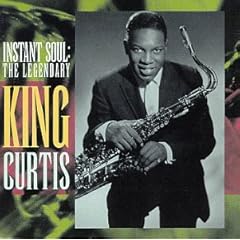Home » Jazz Musicians » King Curtis
King Curtis
Curtis 'King Curtis' Ousley was already a well-respected Jazz tenor saxophonist in 1952 when he moved to New York, to concentrate on doing session work for the growing Pop and R&B markets. Over the next decade, saxophone became the pre-eminent lead instrument within Rhythm & Blues/Rock n' Roll, and King Curtis became its leading exponent, spicing up massive numbers of hits with ear catching solos, sealing his reputation as one of the leading instrumentalists of that era. Perhaps he'll be most remembered as blowing that solo on The Coasters 1958 smash “Yakety Yak.” King Curtis was originally part of the late 40's honking Texas tenor sax brigade, counting Arnett Cobb, Earl Bostic, and Illinois Jacquet as influences. He played in bands of Lionel Hampton and Horace Silver. Upon moving to New York from Fort Worth TX (his 1934 birthplace), he was already well grounded in Jazz, R&B, and Pop. Curtis could play any style on a moment's notice. Curtis had also pursued a highly successful solo career, primarily in contemporary R&B. But he also stretched out with the best Jazzmen: about half of his Prestige output circa 1960-62 he's surrounded by top line players like Jack McDuff, Billy Butler, Billy Gale, Ray Lucas, and Willie Rodriguez. On his classic “Soul Meeting,” the personnel includes: King Curtis (tenor saxophone); Nat Adderly (cornet); Wynton Kelly (piano); Paul Chambers, Sam Jones (bass); Oliver Jackson, Belton Evans (drums) Recording with Capitol, Epic, and Atlantic, he garnered instrumental hits like 1962's “Soul Twist,” and 1967's “Memphis Soul Stew,” . That same year he did a successful cover of “Ode To Billie Joe.” He made a big impression in the late 60's, hooking up with artists like Eric Clapton who performed on King's “Teasin'” album in 1970. The saxophonist had meanwhile put together a superb studio group: The Kingpins, with Richard Tee, Cornell Dupree, Jerry Jemmott and Bernard Purdie, all of whom contributed to several of Aretha Franklin's finest records. King Curtis topped the R&B charts in 1971, handling the sax on Aretha Franklin's version of “Bridge Over Troubled Waters,” and played on several tracks on John Lennon's 'Imagine' album that same year. When King Curtis departed this world in 1971 -the victim of a brutal stabbing outside his apartment- he wasn't yet 40, but was at the apex of his career. In 2000, King Curtis was inducted into the Rock&Roll Hall of Fame.
Tags
Chronicles of King Curtis available at Amazon and Barnes and Noble

Source:
All About Jazz




























